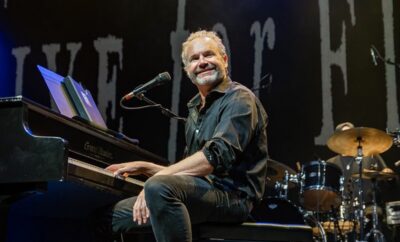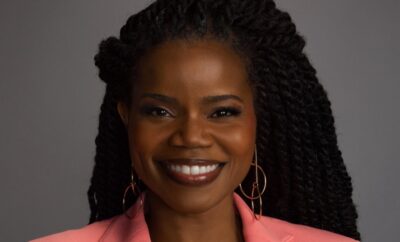
Interviews
Hilary Ward – All the Way
By: Lisa Steinberg
Q) How did you hear about the film All the Way?
A) It was an audition. David Rubin and his assistant Melissa Pryor do a lot of the casting for HBO. They had brought me in previously. This one came up and I was excited when I saw everyone attached. I thought, “They are probably going to get a star to play this,” so I didn’t really think about it. I went in for the audition and found out I had a callback. I went in for a director’s session with Jay [Roach]. He had me do it a few times and gave me notes, but it was a really positive session and I got a message later that day that I was on hold for the role. Then, I didn’t hear anything for about a month. The role was rereleased with breakdowns and taking auditions again so I figured it was done with and my agent called and said they guessed I was released from the hold. They said, “No, no, no! We want to see her again.” They had added a scene and gave me a few more notes. Jay couldn’t be at my callback because they had already started filming. Later on that week they told me I had gotten the role and they were just waiting to work out their schedule.
Q) The movie is based off the play. Did you get a chance to see the play at all prior to portraying her?
A) It’s interesting because I knew there was a play because I have a background in theater. So, I knew some of the artists that worked on the production when it was being performed at the Oregon Shakespeare Festival. Then, it went to Broadway and Bryan Cranston won the Tony Award. I picked it up though to read it myself in case an audition for it came up. I had no idea they were in the works to do the film until the audition came my way. So, it was absolutely coincidental. I had worked on another play called The Good Negro and in a funny way, I had been preparing for the role of Coretta [Scott King] in that play so I had already done a lot of research on her. I had an idea of maybe the kind of woman that she was. So, when this audition came up I felt prepared, like I had a good take on who this woman was.
Q) What made you want to be a part of the film?
A) First off, I think what is interesting about her is that yes, she is an icon. We’ve seen the pictures of her and she was always beautiful and supportive of her husband. I think it’s very easy to forget that she is a woman with hopes, dreams and ambitions. She was a mother and often a single mother because her husband was traveling so much. So, there were very relatable struggles that she was dealing with day in and day out. I read her book and about her. The bottom line is that Robert Schenkkan wrote a beautiful script and it didn’t concentrate as much as the public moments with Coretta and Martin [Luther King, Jr.]. It was when he wasn’t in a leadership positon, just a man struggling with how to move forward. So, I used the circumstances in the scene and what I knew about her, but a lot of it is imagination of, “What would it feel like to be a woman in this situation whose husband is in a lot of physical danger? What would I do? How would I try to handle the situation?”
Q) What was it like working with Anthony Mackie?
A) First of all, it just needs to be known that he is a lovely, generous, funny, fun human being. He set me at ease right away. I was going into filming a little bit late. After I found out I was cast, I just went to the AD and asked if there was any way if I could talk to him. Anthony was very sweet and generous and put me at ease right away and I found him to be that way all throughout shooting. He is really a team player. He made the process so much fun and is loose in between takes, but when the camera is on him he is right there ready to work. I felt completely supported and comfortable.
Q) What did you take away from working with such incredible costars?
A) The cast list is incredible! They were people I had admired for so long and people I have watched as I tried to build my career. I love they do film, theater and television. They are just actors that really love to work. That would have been great all on its own, but I also believe that why the film is so excellent is the feeling on set being so collaborative. We all had a sense of pride with what we were doing and that came from the top with Jay Roach. He just creates an environment perfect for creativity. He is a calm, supportive, open presence on set. You don’t always get that with directors because they are making a lot of decisions. They are holding so many details all at once and trying to prepare so you don’t always have interactions with directors like that. Jay set the tone that put everyone at ease and helped everyone do the best work. You’ll absolutely see that on screen.
Q) I heard you also have a personal connection to being a part of the film.
A) My family was living in Mississippi during that time. My great grandmother passed away a couple years ago and she was just shy of her one hundred and ninth birthday. She remembers jumping on her grandmother’s feather bed and her grandmother had been born a slave. Someone I grew up going to her house every summer knew a slave. It’s not that far away, all of this history. So, my great grandparents in that community started a college to educate young black students. My grandmother was a gardener who was threatened by the clan for teaching black farmers how to make their farms more productive. They were threatened for attempting to register to vote. It turns out my great grandmother wasn’t able to vote for the first time until 1974. She carried her first voting card around with her until the day she died. This was ten years after the events of the film. So, these events and issues were very much apart of their lives. My great uncle (her son) first came to notoriety by covering the Watts Riots. So, all of these activities like the legacy of Jim Crow and the Civil Rights Movements I’ve grown up around because of my grandparents experience.
Q) Be sure fans know about your charity through Chalk Repertory?
A) I started the company with five women who attended the University of California’s San Diego’s theater program. We were excited and ready to work, but we got to LA right as the writers strike happened. So, we were all looking around and thought we had this great training and energy and we knew a lot of people who have excellent work ethic and talent that should be doing something. We decided to put our resources into people instead of things. We started picking out nontraditional places. So, we were able to work at Hollywood Forever Cemetery for our first production. Since then, we’ve worked at La Brea Tar Pits and Clark Historical Library and people’s living rooms and kitchens. It was any place where we feel like we can do the play without having to build and bring all of this stuff. Instead, we can pay our artists and create and an interesting and unique experience for our audience. The other priority was to give opportunities to our community that actually reflects the diversity of Los Angeles. So, it’s a huge priority to have people of color on the stage, behind the scenes and on our design teams and also women writing, directing and starting in our work.





You must be logged in to post a comment Login